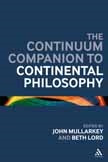Nieuw licht op Kant en Spinoza
Terwijl ik met het vorige blog over Solomon Maimon bezig was, kreeg ik van Henk Keizer de tip over het verschijnen van het volgende boek waarin Beth Lord de relatie van Kant met drie 'Spinozistische lezers' onderzoekt: F.H. Jacobi, J.G. Herder en Solomon Maimon - hoewel… om Jacobi nu een Spinozistische lezer te noemen gaat wat te ver en Herder en Maimon maakten er ook een eigen potje van. Maar invloed op Kant hadden ze en zeker op de verdere verspreiding van Spinoza’s denken. Zij maakten het respectabel en mogelijk dat er in Duitsland (Idealisme en Romantiek) openlijk over Spinoza geschreven kon worden en Spinoza uit het al een eeuw oude verdomhoekje werd gehaald.
Graag breng ik hier de informatie over het boek dat net uit is en over de schrijfster die zich al geruime tijd flink zowel in Spinoza als Kant en zelfs Deleuze verdiept.
 Beth Lord: Kant and Spinozism: Transcendental Idealism and Immanence from Jacobi to Deleuze. Palgrave Macmillan (Renewing Philosophy), 2010, 272 pp
Beth Lord: Kant and Spinozism: Transcendental Idealism and Immanence from Jacobi to Deleuze. Palgrave Macmillan (Renewing Philosophy), 2010, 272 pp
Het boek is nog maar net uit. In het colofon staat 2011 als jaar van uitgave vermeld.
Uitgeversinformatie:
In the late eighteenth century, several thinkers attempted to fuse Kant's transcendental idealism with Spinoza's philosophy of immanence. These 'Spinozistic' readings of Kant had a profound influence on the development of his theories of nature and teleology in the Critique of Judgment, and on the transformation of his philosophical system in the Opus Postumum. Lord examines Kant's relation to three of his Spinozistic readers – F.H. Jacobi, J.G. Herder, and Solomon Maimon – and investigates his response to their provocative suggestion that an immanent ontology solves the problems of transcendental idealism. Lord argues that this is the right context in which to understand Gilles Deleuze's reading of Kant, thereby opening new avenues for understanding both the centrality of Spinozism to Kant's thought, and the complex interrelations between Spinoza, Kant, Maimon, and Deleuze.
This investigation into Kant's relation to Spinozism examines four thinkers who attempted to fuse Kant's transcendental idealism with Spinoza's doctrine of immanence: Jacobi, Herder, Maimon, Deleuze
Contents:
Series Editor's Preface
Acknowledgements
Abbreviations
Introduction
Jacobi's Provocative Suggestion
Against Spinozistic Dogmatism
Herder and Spinozistic Naturalism
Critiques of Teleological Judgment
Maimon and Spinozistic Idealism
Deleuze and Spinozistic Difference
Spinozism in the Ether: Kant's Opus Postumum
Conclusion
Notes
Bibliography
(uit de inleiding - zie PDF met inhoud, inleiding en index )
This book has seven chapters that follow a broadly historical trajectory. Individual chapters can be read independently, or in their natural couplets.
Chapters 1 and 2 are about the engagement with Spinozism that emerged from the pantheism controversy. Chapter 1 looks at Jacobi’s influential interpretation of Spinoza and his suggestion that Kant’s philosophy can be improved through its affinity with Spinozism. In chapter 2 I examine Kant’s response to Jacobi through his rejection of Spinozistic dogmatism in ‘What does it mean to orient oneself in thinking?’ and the Critique of Practical Reason.
Chapters 3 and 4 focus on Kant’s relationship with Herder. In chapter 3 I explain their disagreements over naturalism and teleology, and show that Herder’s Spinozistic naturalism prompts Kant’s key arguments for teleological judgement in the third Critique. Chapter 4 focuses specifically on Kant’s argument against Spinozism in the Critique of Judgment, and its importance for the aims of that text.
Chapters 5 and 6 are about Maimon and Deleuze. Chapter 5 focuses on Maimon’s attempt to deepen transcendental philosophy and make it account for the genesis of the content of knowledge by fusing Spinozism with Kantianism. Chapter 6 examines the complex interrelation between Deleuze, Kant, Spinoza, and Maimon, looking at Deleuze’s ‘transcendental empiricism’ as a Maimonian response to transcendental idealism, and arguing that Deleuze sees a version of a philosophy of difference in both Kant and Spinoza.
Finally, Chapter 7 and the conclusion look at Kant’s Opus Postumum as a response to the demands of Maimon and Deleuze, and at Kant’s puzzling appeal in his last days to ‘Spinoza’s transcendental idealism’.
Over de auteur

 Beth Lord is a Lecturer in Philosophy at the University of Dundee, UK. Her interests centre on Kant, Spinoza, and contemporary continental philosophy. She is the author of Spinoza's Ethics: An Edinburgh Philosophical Guide, and the co-editor
Beth Lord is a Lecturer in Philosophy at the University of Dundee, UK. Her interests centre on Kant, Spinoza, and contemporary continental philosophy. She is the author of Spinoza's Ethics: An Edinburgh Philosophical Guide, and the co-editor  of The Continuum Companion to Continental Philosophy (Continuum, 2009) and director of the Spinoza Research Network.
of The Continuum Companion to Continental Philosophy (Continuum, 2009) and director of the Spinoza Research Network.
Van de publicaties die haar webpagina bij de Universiteit van Dundee vermeldt, zijn er enige op internet te vinden. Deze lezen geeft, denk ik, een goed beeld van wat we van het boek mogen verwachten:
[Latere inlas: NB inmiddels zijn de eertijds aangeboden hierna genoemde PDF's verdwenen. Misschien is een tekst vindbaar op haar latere pagina op academia.edu]
• "Acting with a Good Reason: Kant and Spinoza on Ethics", Philosophy Research Seminar, University of Stirling, April 2007. [PDF]
•"The Virtual and the Ether: Transcendental Empiricism in Kant's Opus Postumum", Journal of the British Society for Phenomenology 39:2 (May 2008). [PDF]
[endnote 58] Spinoza is a name frequently and puzzlingly encountered in the Opus Postumum. It is not clear whether Kant’s allusions to Spinoza reflect a late interest in Spinoza or an attempt to mediate the relation the post-Kantian idealists were beginning to draw between Spinoza’s philosophy and Kant’s own.
Tijdens de conferentie “Thinking with Spinoza: Politics, Philosophy and Religion” die op 7 en 8 mei 2009 aan het Birkbeck College werd gehouden, deed zij als ‘ Principal Investigator for the AHRC Spinoza Research Network’ de lancering van het Spinoza-netwerk. Haar inleiding is hier nog te beluisteren.
(En dan hoor ik niet iemand uit de UK maar uit de USA...)
Zie als vervolg ook volgend blog: "Kwam Kant met z’n Opus Posthumum dichter bij Spinoza’s Opera Posthuma?"
* * *
Toevoeging
Henry Somers-Hall, Review of Kant and Spinozism: Transcendental Idealism and Immanence from Jacobi to Deleuze by Beth Lord.
KSO 2014: 160-169. Posted June 23, 2014 www.kantstudiesonline.ne [cf. academia.edu]
Cf. ook Review by Paul Davies on Notre Dame Philosophical Reviews [NDPR]


Reacties
Potdorie Stan, wat kun jij veel doen met zo'n eenvoudige tip. Niet te geloven.
henk keizer 30-12-2010 @ 20:39
Interessant. Volgens de uitgever van "Herder's Werke" in 1879 (net gelezen) was Jacobi een fel bestrijder van het spinozisme en gebruikte hij oneigenlijke en gezochte argumenten om "de spinozist" Herder te polemiseren. Kant helde voorzichtig naar Jacobi's visie over, volgens deze uitgever ook vanwege deels persoonlijke motieven, daar Herder en hij ook in polemische strijd waren verwikkeld aangaande de functie van het verstand ("rede") en de kenbaarheid c.q. aanduidbaarheid van de Godheid. Hierin nam Kant naar ik meen toch een totaal verschillend standpunt in dan Spinoza, maar ik ben geen geschoold filosoof. De hele "pantheismusstreit" in de 2de helft van de 18de eeuw in Duitsland is m.i. sterk gekleurd door persoonlijke motieven en voorkeurenvan de deelnemers.
Erik Tjallinks 31-01-2012 @ 19:51
Daarom is het interessant te lezen over Lord's "Jacobi’s influential interpretation of Spinoza and his suggestion that Kant’s philosophy can be improved through its affinity with Spinozism." Uit wat ik erover heb gelezen, krijg ik de indruk dat de orthodox-christelijke Jacobi Kant wilde "gebruiken" in zijn kruistocht tegen het in zijn ogen atheïstische spinozisme, en hem zeker niet wilde overhalen dingen over te nemen van Spinoza. Maar mogelijk is dit een 19de eeuwse, achterhaalde opvatting.
Erik Tjallinks 31-01-2012 @ 20:05
P.S. Kunnen begrippen als "transcendentaal " en "immanent" niet eens een keer verbannen worden uit de filosofie? In religieuze en theologische literatuur van de kerken komen ze ook steeds terug en het is me nooit gelukt een omschrijving ervan te begrijpen.
Erik Tjallinks 31-01-2012 @ 20:10
Ooit zal het begrijpen lukken...
Verbannen kunnen begrippen niet worden. Wie moet dat doen, bij ontstentenis van een Groot Inquisiteur...?
'transcendentaal' is geen theologisch begrip; verwarring misschien met 'transcendent''? Gebeurt vaak.
Hier wat blogs als huiswerk over de Pantheismusstreit
6 nov. 2009: Immanuel Kant (1724 - 1804) en zijn grondige afkeer van Spinoza
http://spinoza.blogse.nl/log/immanuel-kant-1724-1804-en-zijn-grondige-afkeer-van-spinoza.html
5 maart 2011: Frans Hemsterhuis (1721-1790) zag 'Système de Spinosa' als een soort theïsme
http://spinoza.blogse.nl/log/frans-hemsterhuis-1721-1790-zag-systeme-de-spinosa-als-een-soort-theisme.html
20 april 2011: Das Wolfenbütteler Gespräch in 1780
http://spinoza.blogse.nl/log/das-wolfenbutteler-gesprach-in-1780.html
29 sept 2011: Pantheismusstreit - mijlpaal of steen des aanstoots? [1]
http://spinoza.blogse.nl/log/pantheismusstreit-mijlpaal-of-steen-des-aanstoots-1.html
29 sept 2011: Pantheismusstreit - mijlpaal of steen des aanstoots? [2]
http://spinoza.blogse.nl/log/pantheismusstreit-mijlpaal-of-steen-des-aanstoots-2.html
2 okt. 2011: Pantheismusstreit - mijlpaal of steen des aanstoots? [3]
http://spinoza.blogse.nl/log/pantheismusstreit-mijlpaal-of-steen-des-aanstoots-3.html
4 okt. 2011: Pantheismusstreit - mijlpaal of steen des aanstoots? [4]
http://spinoza.blogse.nl/log/pantheismusstreit-mijlpaal-of-steen-des-aanstoots-4.html
17 nov. 2011: Gotthold Efraim Lessing (1729 – 1781) was toch geen Spinozist
http://spinoza.blogse.nl/log/gotthold-efraim-lessing-1729-1781-was-toch-geen-spinozist.html
Dat laatste heb je al gelezen, zag ik.
Stan Verdult 31-01-2012 @ 20:43
Erik,
Advies: een filosofisch woordenboek aanschaffen, Ik heb veel plezier van Mautner (ed): Penguin Dictionary of Philosophy.
1. Transcendent = overstijgend, dat wat de grenzen van de ervaring overschrijdt, de bovenzinnelijke wereld, dat wat buiten deze wereld is. Voorbeeld: de godsdienstgod is transcendent, want niet kenbaar. Voor Levinas is de Ander transcendent, want elke ander is voor mij ten dieptste niet kenbaar. Transcendent is een algemene filosofische term.
2. Transcendentaal = dat wat de ervaring mogelijk maakt, namelijk tijd, ruimte en causaliteit. en a priori in de mens aanwezig is, noodzakelijk aanwezig moet zijn om de ervaring van de wereld mogelijk te maken. Het is een specifiek kantiaanse term.
3. Immanent = inblijvend, dat wat (in) deze wereld is, kenbaar is. De god van Spinoza is immanent. Het is een algemene filosofische term.
Adrie Hoogendoorn 31-01-2012 @ 20:47